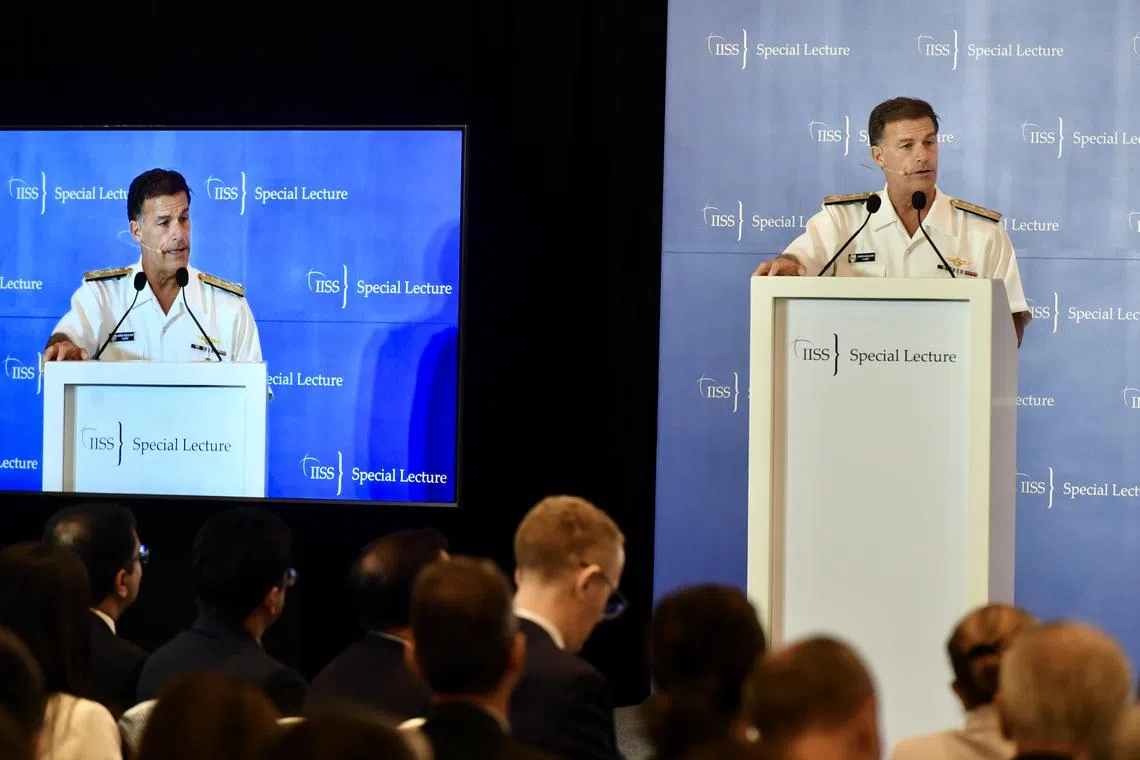Global order at risk of destabilising due to actions of ‘revisionist powers’: Top US admiral
Sign up now: Get ST's newsletters delivered to your inbox

Admiral John Aquilino's speech comes as regional US allies have ramped up their defences in recent months.
ST PHOTO: DESMOND FOO
Follow topic:
SINGAPORE - The United States military continues to operate in the Indo-Pacific region because the international rules-based order is at risk of global destabilisation, a top US admiral warned on Thursday.
Without naming any country, Admiral John Aquilino said “revisionist powers” were seeking to disrupt and displace the current system in ways that benefit themselves at the expense of all others.
They use coercion and intimidation to achieve their objectives, and justify their actions under a theory of “might equals right”, he said in a speech in Singapore. They also make illegal territorial claims, empower law enforcement entities to harass nations operating legally within their own exclusive economic zones, and ignore international legal rulings.
“Some have even proposed alternative security options, and while on the face they look benign, their real purpose is to establish an alternative to this rules-based order in ways that benefit one nation and at the expense of all others,” added Adm Aquilino, who leads the US Indo-Pacific Command.
But the US is not seeking conflict in the Indo-Pacific region, he stressed. It also does not seek to contain China, although both countries are engaged in “robust” competition.
The US has also not changed its policies towards Taiwan, and does not support its independence, he added. “We do, however, support peace and prosperity and stability in the Pacific, free of coercion and bullying.”
The admiral’s address on Managing Strategic Competition and the Quest for an Enduring Future in the Indo-Pacific was delivered at an International Institute for Strategic Studies Asia event at the Shangri-La hotel.
In his 15-minute speech, he said the world has evolved from an era of globalisation – in which economics drove geopolitics – to another era with renewed great power competition, where the security environment influences trade and investment.
The US, as a Pacific nation, will continue to fly, sail and operate anywhere international law allows to demonstrate the freedom of navigation rights of all nations, he said.
“My concern is that this foundation of the rules-based international order, this right to order our lives as we see fit, is under direct assault by authoritarian regimes,” said the admiral, whose command is responsible for US military activities in the region, spanning the Indian sub-continent to South-east Asia and the Pacific Ocean.
He highlighted US efforts to raise deterrence, such as through military exercises, diplomatic efforts, intelligence sharing and economic collaboration, through agreements such as the Indo-Pacific Economic Framework for Prosperity.
“I will say it again, the US does not seek to contain China, but we will compete, and by competing, we will demonstrate the superiority of the current rules-based international order that provides all nations the opportunity to reach their full potential.”
The admiral’s speech comes as regional US allies have ramped up their defences in recent months. Japan announced a significant defence budget hike in December, and Australia earlier this week unveiled details about its plans to acquire nuclear-powered submarines in the coming decades.
Beijing has in turn hit out at the “hegemonic, domineering and bullying practices” of the US in a 4,000-word report published in February. Last week, President Xi Jinping also took the rare step of rebuking the US publicly,
In a question-and-answer session at Thursday’s event, Adm Aquilino said “no” when asked if he was satisfied with the guard rails in place with China to prevent an accidental war in the region.
He said a request to speak with either the commander of China’s eastern or southern theatre has gone unanswered for a year and a half since he took command in 2021.
“We continue to ask because I do think it is important, but it is concerning to me that I don’t have the ability to talk to someone, should there be a reason to talk,” he said.

